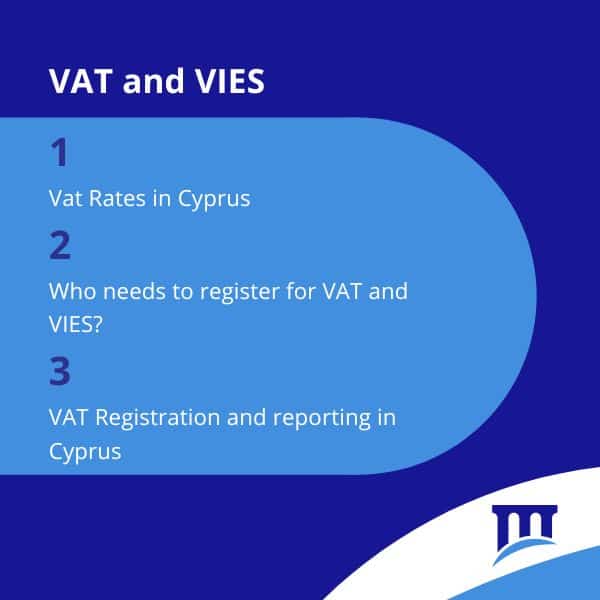Table of Contents
What is VAT?
The Value Added Tax (VAT) is a consumption tax paid on products and services at every step of production or delivery. VAT is an important aspect of Cyprus’s tax system, providing the government with a major revenue stream. The tax is levied on the value added to products or services, resulting in a multi-stage tax. Businesses must understand their VAT registration, charging, and reporting duties in order to comply with Cypriot VAT rules. Understanding how VAT works is critical for every seller or supplier doing business in Cyprus, as it directly affects pricing and invoicing techniques.
Furthermore, VAT plays an important role in the European Union’s (EU) tax framework, influencing cross-border transactions between member states. Companies in Cyprus who sell goods or services must include VAT in their pricing and financial statements. The VAT system ensures that consumers suffer the final tax burden, with businesses acting as intermediaries to collect and return the tax to the government. This method fosters transaction transparency and ensures a consistent income stream for public services, which is why compliance with VAT legislation is a major need for enterprises in Cyprus.
For any questions regarding VAT and VIES registration Cyprus, we are happy to assist
VAT Rates in Cyprus
VAT in Cyprus is charged at varying rates based on the type of the products or services offered. The standard VAT rate is currently set at 19%, which applies to the majority of transactions. Certain products and services, such as hospitality and necessary food items, have lower rates of 9% and 5%, respectively.
Additionally, certain exports and overseas services are subject to a zero-rate VAT, allowing enterprises to remain competitive in the worldwide marketplace. Companies conducting intra-community transactions should keep in mind that VAT rates may differ between EU member states, thereby influencing pricing and sales strategies. This intricacy highlights the importance for Cypriot businesses to have proper VAT records and understand how to apply the relevant rates to their goods or services. Businesses that stay up to date on VAT rates can efficiently ensure compliance and optimise their tax responsibilities.
Who needs to Register for VAT?
In Cyprus, any business with a taxable turnover greater than the registration threshold must register for VAT. The current threshold is €15,600, which means that enterprises that exceed this amount in taxable supplies within a 12-month period are legally required to register. This obligation applies to both Cypriot and international enterprises doing business in the country. In addition, firms that plan to reach the threshold during the next 30 days must register for VAT. Understanding these requirements is critical for ensuring compliance and avoiding potential penalties.
Moreover, certain types of transactions, such as intra-community supplies of goods or services to other EU member states, also necessitate VAT registration regardless of the turnover.
Benefits of VAT Registration
Registering for VAT in Cyprus has various advantages for enterprises, particularly those involved in the sale of products or services. For starters, registered enterprises can refund VAT paid on purchases, lowering their operational costs significantly. This approach enables businesses to maintain a steady cash flow while investing in growth possibilities. Additionally, VAT registration boosts a company’s legitimacy, making it appear more competent and trustworthy to clients and suppliers. Many firms prefer to operate with VAT-registered entities because they simplify the invoicing process and assure compliance with regulatory requirements.
Furthermore, VAT registration enables businesses to smoothly participate in intracommunity trade throughout the EU. It allows firms to conduct cross-border transactions without paying additional taxes, providing they follow the VAT legislation of the respective member states. This feature is very useful for Cypriot businesses wishing to broaden their market reach. Overall, VAT registration can help firms in Cyprus achieve long-term success and sustainability.
VAT Exemptions
In Cyprus, some goods and services may be exempt from VAT, which can have a significant impact on businesses and pricing strategies. Financial services, insurance, and some educational and health services are among the most frequently excluded. Understanding these exclusions is crucial for businesses because it affects their capacity to collect VAT and reclaim input tax from related transactions. For example, if a company provides exempt goods or services, it cannot recoup the VAT paid on the expenses related with those exempt operations, which may result in increased operational costs.
Furthermore, non-profit organisations and small enterprises may benefit from particular exclusions and simplified VAT schemes to reduce their tax burden. Businesses should carefully analyse their activities to see whether they qualify for any VAT exemptions. Proper tax planning may help firms improve their VAT status, guaranteeing compliance while reducing expenses. As a result, businesses trying to efficiently traverse the complexity of the Cypriot VAT landscape must first develop a thorough grasp of VAT exclusions.
The VAT Registration Process in Cyprus
The VAT registration procedure in Cyprus consists of various phases that firms must follow in order to comply with VAT legislation. First, businesses must collect the necessary paperwork, which include evidence of identification, business registration information, and any applicable financial information. Once these documents are completed, firms can submit a VAT registration application to the Tax Department. The processing time for registration varies, but businesses can expect to wait several weeks before acquiring their VAT number.
Following successful registration, firms must meet continuing responsibilities, such as timely VAT returns and filings. Companies must file VAT returns monthly or quarterly, depending on their turnover and preferences. This frequent reporting helps that firms meet their VAT responsibilities and manage their tax liabilities properly. Thus, knowing the VAT registration procedure and its criteria is crucial for businesses operating in Cyprus, as it allows them to avoid fines and maintain a good relationship with the tax authorities.
Required Documents for VAT Registration
To register for VAT in Cyprus, firms must complete and submit a series of documentation to the Tax Department. Primary papers include the company’s registration certificate, evidence of business address, and identity documents for the directors or owners. Furthermore, any relevant financial accounts or accounting documents may be required to establish the nature of the firm and its projected turnover.
Ensuring that all paperwork are full and exact is critical, since errors can cause delays or issues in the registration process.
Visit our accounting services page to find out more
The VAT Registration Process in Cyprus
Initially, businesses must complete the VAT registration form, which may be acquired online or via the Tax Department. After completing the form, firms must submit it together with the necessary documentation. The Tax Department will assess the application and, if everything is in order, give a VAT number, allowing the firm to legitimately charge VAT on its sales.
It is crucial for businesses to monitor the status of their application during the processing period.
Technical Issues in Online Registration
Online VAT registration in Cyprus is convenient; yet, businesses may meet technological challenges during the procedure. Common challenges include difficulty navigating the online platform, submission mistakes, and document upload issues. Such technical issues can cause annoyance and delays in getting a VAT number, which is required to conduct business lawfully. Companies should prepare ahead of time and test their internet connection and device compatibility before attempting to register online.
VAT Submissions and deadlines
Companies must file VAT returns monthly or quarterly, depending on their turnover and desire. The dates for these submissions are critical since late files might result in fines and interest costs. Businesses should have a clear plan for preparing and filing VAT returns to guarantee timely compliance and prevent excessive financial constraints.
To ensure that VAT returns are submitted smoothly, firms must keep correct financial records throughout the reporting period. Proper accounting enables businesses to monitor their taxable activities and compute the VAT payable properly. Businesses should also be aware of any changes in VAT legislation, since they might affect reporting obligations and deadlines. Companies may efficiently manage their VAT duties and avoid potential fines by focussing on timely filings and keeping ordered records.
Misunderstanding VAT Requirements
Many firms suffer difficulties as a result of a misunderstanding of VAT rules in Cyprus. Companies may misread their duties for registration, reporting, or exemptions, resulting in noncompliance and potential penalties. A prevalent misperception is that small enterprises with modest turnover do not need to register for VAT, which might lead to unforeseen consequences if they surpass the threshold. Understanding the complexities of VAT legislation is critical for businesses since it immediately impacts their financial health and legal position.
VIES Registration in Cyprus: What You Need to Know
The VAT Information Exchange System (VIES) is a critical instrument for enterprises conducting commerce throughout the EU. It enables businesses to check the VAT registration status of their suppliers and consumers in other EU member states, guaranteeing compliance with cross-border VAT rules. Businesses in Cyprus that conduct intracommunity transactions must register with VIES to ensure proper reporting and filing of VAT returns.
Why Using the VIES database?
Using the VIES database, Cypriot firms may confirm that they are dealing with VAT-compliant partners, protecting their operations from any tax obligations. As a result, knowing the relevance of VIES registration is critical for businesses looking to efficiently expand their market reach throughout the EU.
What is VIES?
The VAT Information transmission System (VIES) was designed by the European Union to enable the transmission of VAT-related information between member states. It allows companies to check the VAT registration status of suppliers and consumers in other EU nations, lowering the risk of VAT fraud and assuring tax compliance.
Who Should Register for VIES in Cyprus?
Any business doing cross-border transactions inside the EU should register for VIES in Cyprus. This covers businesses who offer products or services to clients in other EU member countries, as well as those that buy from overseas suppliers. Businesses who register for VIES may verify their trading partners’ VAT status, guaranteeing compliance with tax legislation and reducing the danger of fines. Companies that surpass the VAT registration level or conduct large intracommunity transactions are strongly urged to register.
How to Register for VIES
Registering for VIES in Cyprus is a simple process that is usually done with VAT registration. Once a company registers for VAT, it is instantly assigned a VAT number that may be used for VIES purposes. Companies must supply precise information throughout the VAT registration procedure, since this is required for VIES verification. Businesses may utilise the VIES database online to check the VAT status of their business partners, making the procedure more efficient and user-friendly.
For any questions regarding VIES registration, we are happy to assist
Christos Makrides and Associates
Christos Makrides and Associates Ltd is an ICPAC registered Cyprus Accounting Company, authorised and licensed for the provision of financial consulting and audit services, with registration number E189/A/2013.
Our committed group of certified accountants provides a full range of services designed to satisfy the particular requirements of Cyprus’s businesses. You may effectively handle your financial responsibilities with our help, guaranteeing adherence to regional laws and global norms.
Working with us gives you peace of mind and the freedom to concentrate on what really counts – expanding your company.
Conclusions
To summarise, knowing VAT and VIES registration in Cyprus is critical for firms operating in the region. Compliance with VAT requirements not only protects businesses from penalties, but it also improves their credibility and operational efficiency. Companies who register for VAT and VIES can optimise their tax responsibilities, expedite cross-border transactions, and guarantee they deal with VAT-compliant partners. This proactive approach to VAT and VIES registration prepares firms for success in both the Cypriot market and the larger EU landscape.


